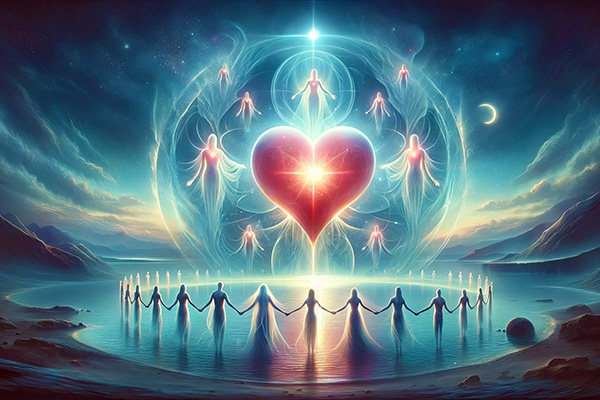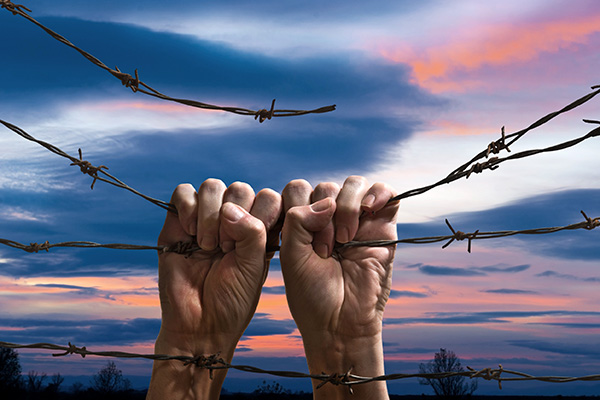karma
Are You On The Karmic Path Of Grace?
 Every step we take in life shapes not only how we feel, but also where we end up in life and how others respond to us.
Every step we take in life shapes not only how we feel, but also where we end up in life and how others respond to us.
Sayings such as “you reap what you sow,” “what goes around comes around,” and “your vibe attracts your tribe” represent the complex interplay between our choices and actions and the reality we experience each day.
This is known as the universal law of cause and effect, also known as the spiritual principle of karma. Every choice we make has consequences, whether seen or unseen. Every action we take – whether physical, mental, emotional or spiritual – has a corresponding result or consequence.
Nothing in life happens by accident. Our values, beliefs, mindset and attitude all help to shape our life path and destiny. Our choices, behaviors, and even our thoughts have a ripple effect. Our free will choices ultimately determine our life journey and the legacy we will someday leave behind.
In essence, the energy or intent behind our actions affects the results we experience in life. Positive actions attract positive results, while negative actions can lead to challenges or difficulties. Over time, the cumulative effect of these causes and their consequences determines the course of our lives, affecting relationships, opportunities, and personal growth.
For this reason, it is essential that we be mindful of everything we say and do. We must cultivate self-awareness and take personal responsibility because every step we take affects our future and our destiny.
The Unresolved Karmic Bonds Between Souls
 Have you ever found yourself thinking about an old friend or flame that you haven’t spoken to in years, and they suddenly show up in your life in the most unexpected place? This often happens when we are still energetically connected to someone.
Have you ever found yourself thinking about an old friend or flame that you haven’t spoken to in years, and they suddenly show up in your life in the most unexpected place? This often happens when we are still energetically connected to someone.
There are invisible energy cords that connect us to many different souls across dimensions and incarnations. These karmic connections are deep soul bonds that transcend time and space and span multiple lifetimes.
Those we love (or hate) – whether a partner or spouse, family members, friends – are all karmically connected to us.
Karmic connections aren’t easily severed. They also don’t simply disappear when we physically part ways in this world. These invisible cords keep us tied to those we’ve loved, lost, or even hurt—until we consciously choose to break free.
Karmic connections continue across lifetimes unless they are consciously severed and dissolved. But these energetic cords of attachment can be difficult to break. We may believe that a relationship is over on a logical level, but energetically the connection remains.
When betrayal or heartache occurs, an energy cord remains between the heart chakras of both individuals, often leading to a recurring cycle of pain and energy depletion due to these lingering connections.
Traumatic events, emotional or sexual attachments, promises, contracts and vows all create strong connections between souls. We often feel a sense of unfinished business when a promise or vow is broken or left unfulfilled.
The Mystery Of Soul Groups And Soul Contracts
 In my work as a spiritual counselor to many people around the world, I have learned that we all belong to soul groups or families, and that each of us chooses to participate in our current lifetime in a certain way based on a pre-birth soul agreement or contract that we commit to before we come into this world.
In my work as a spiritual counselor to many people around the world, I have learned that we all belong to soul groups or families, and that each of us chooses to participate in our current lifetime in a certain way based on a pre-birth soul agreement or contract that we commit to before we come into this world.
I like to think of it as “auditioning for a play.’ Before we incarnate, we can choose to be in a comedy, a drama, an action, a horror, an epic adventure, or even a combination of all of these. We can also choose to take a central leading role, or just be a supporting cast member, or perhaps even a cameo or extra taking a background position.
What position are we willing and ready to take? This in itself can be a great karmic challenge as well as a profound learning experience. For example, if we have chosen a role that has caused grief or harm in a previous life, we will return in this life to try to resolve these latent karmic issues. If we are successful, it is wonderful because we can then pursue a completely different role or existence, or move on to something completely different in a future role.
Soul groups consist of a circle of souls with whom we have shared previous lives and are likely to meet in future lives. These groups are our spiritual families, and the members play different roles in each other’s lives through the process of soul evolution. We continually change roles in different lifetimes with other members of our soul group to facilitate learning and growth.
By interacting with these familiar souls from lifetime to lifetime, we create ongoing scenarios that karmically challenge us, assist us in our soul growth and evolution, and ultimately lead us to a state of spiritual fulfillment and enlightenment where our soul has transcended material limitations and reached its highest potential.
12 Universal Spiritual Laws You Need To Know
 Most spiritual seekers today are familiar with the universal Law of Attraction. But did you know that there are several other universal spiritual laws that govern our existence?
Most spiritual seekers today are familiar with the universal Law of Attraction. But did you know that there are several other universal spiritual laws that govern our existence?
The origins of our understanding of the universal spiritual laws are deeply rooted in various religious and philosophical traditions, as well as in the collective wisdom of human experience since the dawn of time.
Many of these spiritual laws are rooted in ancient wisdom traditions from around the world. These traditions evolved over thousands of years as sages, scholars, and spiritual leaders refined and elaborated upon the fundamental principles that govern all existence.
Mystical traditions within various religions have also played an important role in the development and interpretation of these spiritual laws. Mystics tend to explore the deeper, esoteric aspects of their faith, seeking direct experience of divine truths. Their insights and revelations have contributed to a deeper understanding of spiritual principles beyond literal interpretations of religious texts.
Philosophical traditions in ancient Greece, China, and other civilizations also contributed to the development of spiritual principles that later evolved into universal laws. Thinkers such as Plato, Aristotle, Confucius, and Laozi explored concepts related to ethics, metaphysics, and the nature of reality that influenced later spiritual teachings.
Finding Your Strength And Peace In Difficult Times
 I’ve noticed many of my clients feeling as though the world is crumbling around them lately, unsure of how to navigate the chaos that surrounds them.
I’ve noticed many of my clients feeling as though the world is crumbling around them lately, unsure of how to navigate the chaos that surrounds them.
If this is true for you, then it is essential to remind yourself that the actions and choices of others do not define your path – it’s theirs to walk, not yours. Your focus should remain on your journey and how you can positively impact the world around you. Spirit has been very clear in its guidance in this regard.
Everyone has something in their soul that they need to release, move past and grow from or it will just karmically repeat itself in every lifetime. Let go of trying to fix other people or solve their problems and just move forward with your own life. Do not give your power away to anyone, for Source is with you and always wants you to keep your power.
If you find yourself constantly watching the news, engaging with negative content on social media, or dealing with recent grief from the loss of loved ones to suicide, terminal illness, or strained relationships, it’s time to take a step back and ground yourself.
Grief, stress, and anxiety can take a toll on your mental, emotional, and spiritual well-being. During these times, reconnecting with your spirituality and grounding yourself can provide comfort, strength, and a sense of peace. It is important that you do not let go of your inner power or allow the outside world to suck the life out of you.
Free Yourself From Karmic Debt
 One of the most important things we must do before we leave this life and embrace the next is to ensure that our karmic debts are completely resolved. By doing so, we leave this world unburdened and ready to embrace our next existence with complete bliss.
One of the most important things we must do before we leave this life and embrace the next is to ensure that our karmic debts are completely resolved. By doing so, we leave this world unburdened and ready to embrace our next existence with complete bliss.
Now, if the consequences you may suffer in the afterlife are not of much concern to you, and you feel that karma is not really your problem, you may want to reconsider.
Carrying the heavy burden of karmic debt can also cause considerable misery and struggle in our present daily lives, manifesting as recurring negative patterns and obstacles that hinder our progress and well-being.
Our unresolved karma often leads to dysfunctional relationships, financial difficulties, health problems, and emotional turmoil as past harmful actions generate corresponding negative consequences. An ongoing state of karmic debt fosters feelings of frustration, helplessness, and despair, making it difficult to achieve happiness, joy, fulfillment, and peace.
By carrying the weight of unresolved karmic debt, you may find yourself trapped in a cycle of suffering, unable to break free and achieve the positive, fulfilling life you desire.
Karmic debt is a concept rooted in the spiritual principle of karma, which is a fundamental belief in many Eastern philosophies and religions, especially Hinduism and Buddhism. Karma refers to the universal law of cause and effect, whereby every action has a corresponding reaction. Our poor choices and negative actions create a spiritual debt. By acknowledging this debt and resolving our past mistakes, we achieve a state of inner peace, higher consciousness, spiritual growth and enlightenment.
The Karmic Magnetism Of A Soul Love Connection
 When we meet someone that we feel a deep, inexplicable love connection with – that magical spark that goes way beyond the surface – it’s never just chance or luck. It happens when two souls resonate on a deeper level, be it emotional, spiritual, or psychological.
When we meet someone that we feel a deep, inexplicable love connection with – that magical spark that goes way beyond the surface – it’s never just chance or luck. It happens when two souls resonate on a deeper level, be it emotional, spiritual, or psychological.
Spiritually, we are like magnets. Sometimes we are irresistibly drawn to people who have qualities or energies that match our own. Other times we’re fascinated by those who seem to embody qualities that are different or even opposite to our own.
Like opposite poles of magnets, soul mates or spiritually compatible partners feel a natural pull toward each other. This attraction can be inexplicable, a deep sense of recognition, or a familiar feeling of “coming home.
This kind of attraction is never random; it’s part of the divine plan that guides our journey of personal growth and soul evolution. The people we’re attracted to, whether similar or different, offer us unique opportunities for spiritual growth.
This kind of special mutual attraction is part of our spiritual journey – a dance orchestrated by the universe. Whether we call them soulmates, twin flame connections, or soul contracts, they are spiritually significant partnerships designed to catalyze mutual growth.
For this reason, these connections often involve profound synchronicities and deeply transformative experiences. In fact, these types of relationships are one of the most important pathways for karmic learning, healing, growth and evolution in this lifetime.